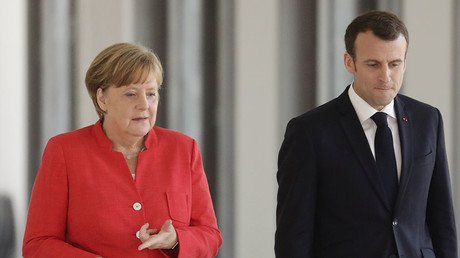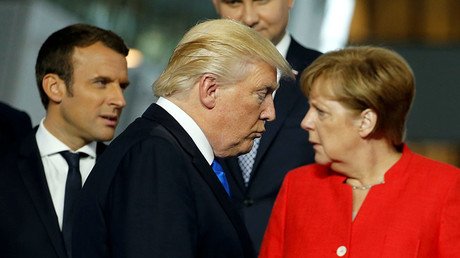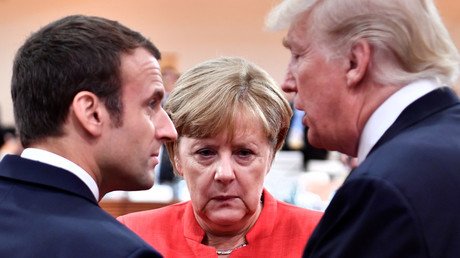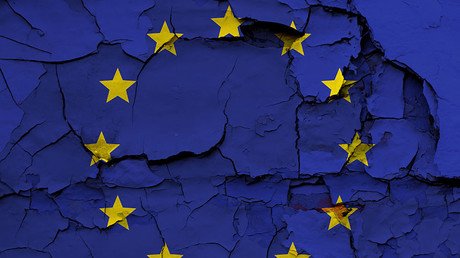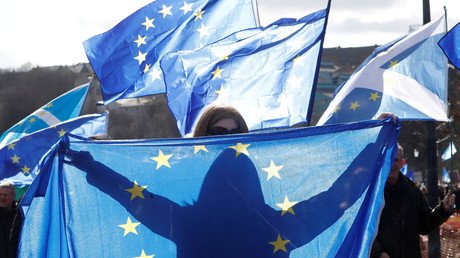Selfish US diktats could push Europe to develop ties with Russia, China & Iran
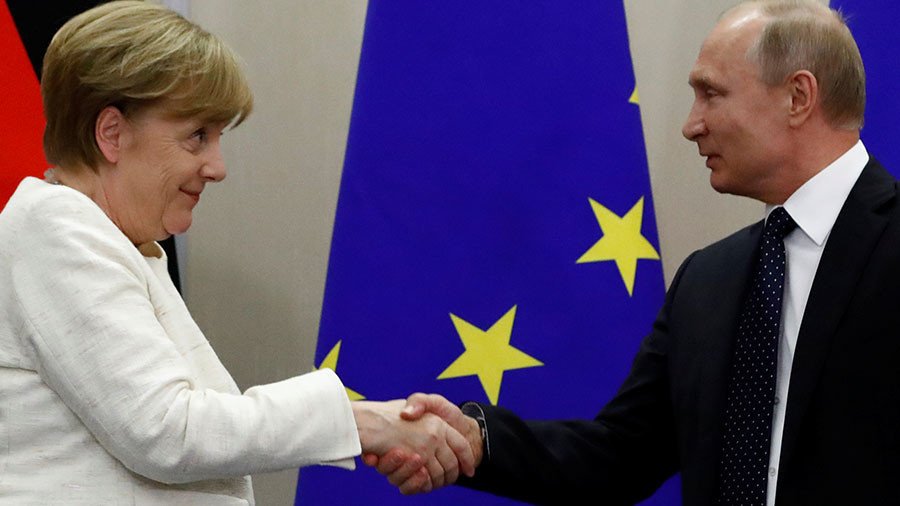
Russian President Vladimir Putin’s cordial reception for German leader Angela Merkel in Sochi last Friday made for a pleasant contrast to the boorish way that Washington is acting towards its European allies.
On a sun-lit day at the Black Sea resort, Putin greeted the German chancellor with smiles and a bouquet of roses. After discussions, the two leaders told reporters about the need for cooperation and dialogue to resolve various international issues, including the Ukraine crisis, conflict in Syria, and the Iran nuclear deal.
Three days before Merkel visited Sochi, the Americans delivered yet another snub to their supposed European allies. US envoy to Ukraine Kurt Volker went to the Kiev-controlled side of the conflict zone in the eastern Donbass region, where he declared American military support for retaking the breakaway self-proclaimed republics of Donetsk and Lugansk.
The envoy also said that President Donald Trump and Defense Secretary James Mattis were “on the same page” concerning the Ukraine policy.
Volker’s hardline message was a revelation of Washington’s role in the four-year-old Ukraine conflict, which has seen the US-backed Kiev regime launch an offensive on the breakaway republics. The eastern areas declared independence following the illegal overthrow of the Ukraine government by US-backed factions in February 2014. The factions that came to power characteristically espouse anti-Russian sentiments and Neo-fascist politics, which the ethnic Russian people of Donbass repudiated.
Washington – which made its first delivery of lethal military equipment to Kiev forces last month – is thus standing in direct violation of the Minsk Peace Accords that were negotiated in 2015 under the so-called Normandy Format brokered by Russia, Germany and France.
In Sochi, Merkel and Putin restated the importance of abiding by the Minsk agreement.
Washington is thus audaciously snubbing the Minsk process and its European allies, in particular Germany and France.
Hours before Merkel arrived in Sochi, there was a surge in ceasefire violations along the contact line in Donbass, reportedly committed by the US-backed Kiev forces.
It seems certain that given the recent supply of US weaponry and the American envoy’s gung-ho rhetoric about retaking the breakaway republics, the Kiev forces were emboldened to send Merkel a message ahead of her meeting with Putin. The message being: to hell with Minsk and dialogue.
It also seems plausible that the Americans gave the Kiev regime a tacit green light to step up the violence to coincide with Merkel coming to Sochi. Merkel may be talking about dialogue and adhering to the Normandy Format with Russia, but in effect Washington is giving the orders for more aggression.
The upsurge in ceasefire violations is exactly what Moscow warned of if Washington proceeded with supply of Javelin anti-tank missiles.
Putin and Merkel also emphasized ongoing cooperation on the Nord Stream 2 project delivering natural gas to Europe via Germany. The $11 billion, 1,222km pipeline under the Baltic Sea is estimated to double the gas supply to Germany by 2019. It represents a major joint venture investment by Russia and Germany, as well as other European energy companies.
Another area of cooperation concerns the Iran nuclear accord. Merkel and Putin said Europe and Russia remain committed to the 2015 UN-ratified accord, despite the Trump administration’s abrupt withdrawal earlier this month.
Again, Washington has strained transatlantic relations on both counts. While Merkel was in Sochi, Washington reiterated threats that it would impose sanctions on Russia and Germany if they proceed with the Nord Stream 2 project. The US has justified invoking sanctions on “national security grounds” owing to alleged Russian meddling in its 2016 presidential elections, as well as due to the crisis in Ukraine, which Washington blames on Russian interference.
The Trump administration has also warned that European companies and banks could be liable for secondary sanctions if they continue to do business with Iran under the terms of the Joint Comprehensive Plan of Action (JCPOA), the formal name for the Iran nuclear deal.
Trump’s tearing-up of the JCPOA comes with the US re-imposing sanctions on Iran which were supposed to have been cancelled through the earlier signing of the accord by the Obama administration. If Trump follows through with threats of secondary sanctions on European firms, it could cost the Europeans billions of dollars’ worth of investments and trade.
The intensifying disputes between the US and Europe reach back to several other broken understandings, including the Paris climate accord, which Trump ditched last year, as well as Washington playing hard ball over trade tariffs and financial contributions to NATO military spending.
What seems to be emerging is the US using high-handed tactics to unilaterally push European partners into accepting Washington’s strategic priorities. In particular, sanctions are being wielded by the Americans to coerce others into conforming with US economic interests.
The Nord Stream 2 project is a perfect example. The US wants to dislodge Russia as the gas supplier to the vast European energy market. But American gas would cost 20-30 percent more than Russian supplies. In order to warp market forces in its favor, the Americans are using sanctions under dubious pretexts. The upshot is the Europeans will pay more for energy supply, which will have widespread inflationary knock-on impacts.
For the Europeans, recent geopolitical developments represent a harsh learning curve. Following Washington’s policy has already cost the Europeans bitterly in terms of the Ukraine crisis and the US-led sanctions on Russia. The biggest loser in terms of exports and jobs is Europe.
That crisis has led a precarious decline in relations between Europe and Russia from the buildup of US-led NATO military forces. If a war were to break out, it would be Europe that would bear the brunt of catastrophe.
What seems clearer than ever is Washington’s arrogant disregard for European interests. Threatening sanctions on European businesses over legitimate participation in the Iran nuclear deal and jeopardizing regional security are just two examples of how little Washington actually cares about so-called allies.
Then when Europe’s strongest leader, Germany’s Merkel, makes a cordial visit to Russia, Washington blatantly delivers a slap to her pronouncements on cooperation and dialogue for finding peace in Ukraine, or on the future of European energy security from working with Moscow.
Europe is learning the hard way that it has much more to gain from developing amicable relations with Russia than from pursuing Washington’s self-serving policy of hostility.
That has long been the case, arguably. But what is making the case increasingly palpable and urgent is the way Washington is riding roughshod over Europeans, inflicting economic and material pain on their livelihoods. That harsh experience of Washington’s selfish diktats will inevitably drive Europe to asserting more independence and possibly seeking more normal relations with Russia, as well as China, Iran and others.
Some cynics in Western media pooh-poohed Putin’s bouquet of flowers to Merkel, snidely saying the Russian leader was condescending. How irrational. What’s wrong with showing a little human kindness and respect? American politicians seem to have no idea about that. Giving orders and cynicism is all they seem to know.
The statements, views and opinions expressed in this column are solely those of the author and do not necessarily represent those of RT.

